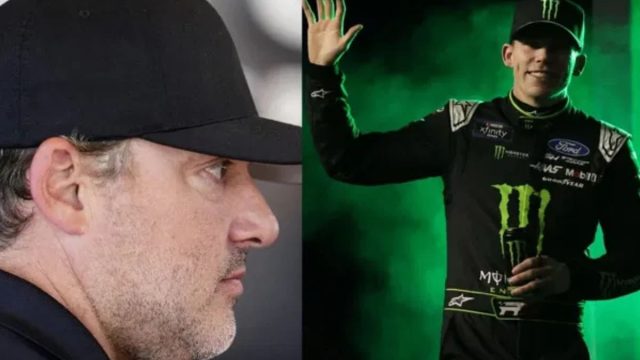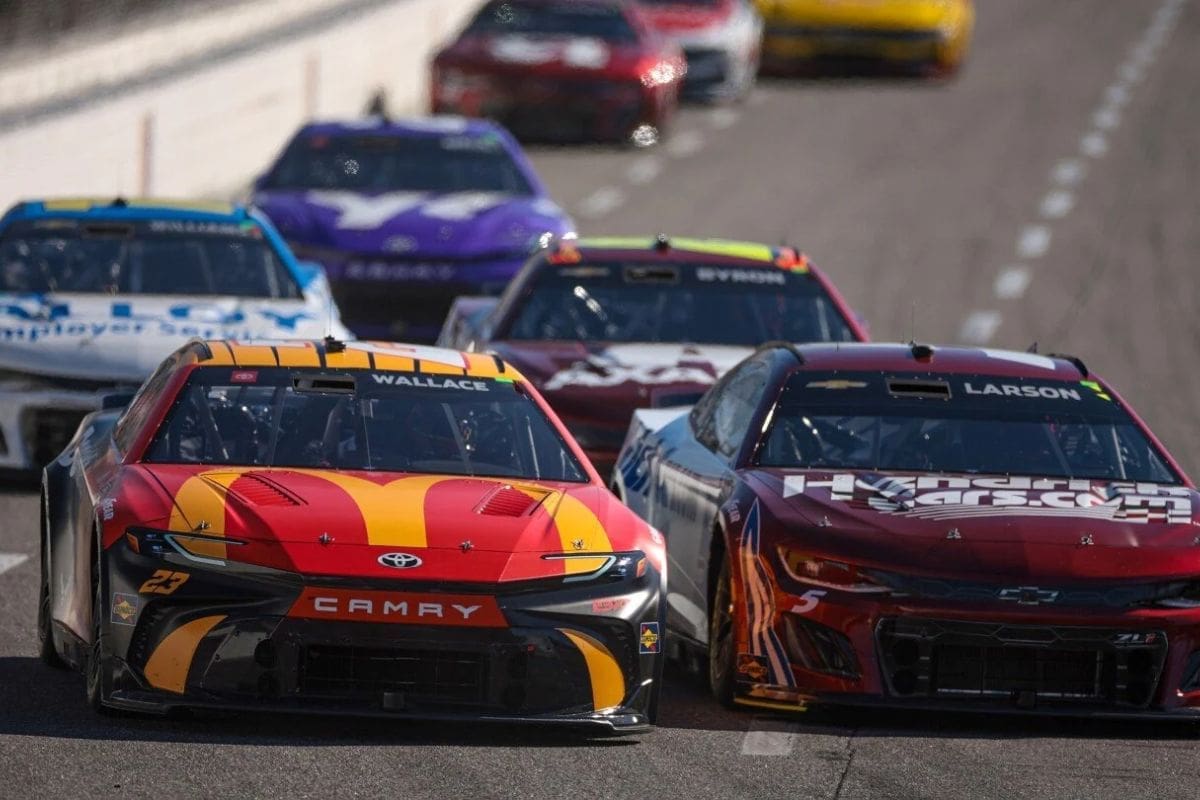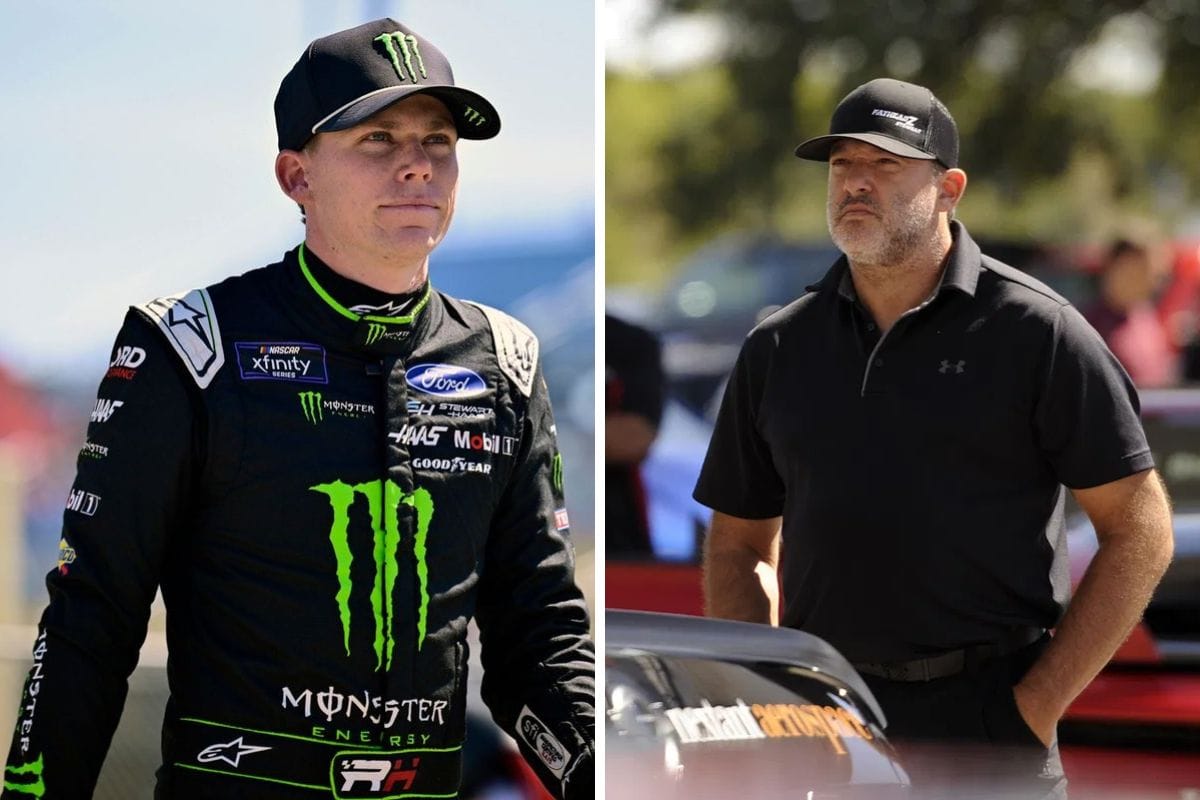Riley Herbst Blames Tony Stewart’s Leadership: Riley Herbst‘s recent remarks regarding Tony Stewart‘s management style raise critical questions about the dynamics at Stewart-Haas Racing (SHR). Herbst attributes the team’s unexpected downturn to Stewart’s hands-off approach, suggesting that while independence can foster growth, it may also leave less experienced drivers without crucial guidance. This shift in leadership methodology coincides with the challenges posed by the Gen 7 car, complicating the competitive landscape further. As SHR navigates these hurdles, how will this influence both Herbst’s career path and the team’s future prospects in NASCAR?
Key Highlights
- Riley Herbst’s development has been impacted by the absence of direct mentorship from Tony Stewart since his departure from leadership roles.
- Herbst attributes some performance struggles to a lack of hands-on guidance that Stewart previously provided to drivers.
- The downsizing of SHR from four Cup cars to one reflects the organization’s financial challenges and strategic reevaluation post-Stewart.
- Herbst’s growth relies heavily on support from experienced teammates like Kevin Harvick and Cole Custer, highlighting the need for mentorship.
- The competitive landscape of NASCAR emphasizes the importance of driver development, which has faltered without Stewart’s direct influence.
Stewart-Haas Racing’s Struggles and Downsizing in 2024
Stewart-Haas Racing’s current predicament reflects a dramatic shift in the competitive landscape of NASCAR, particularly since the introduction of the Gen 7 car. Once a powerhouse in the sport, the team has faced considerable challenges, resulting in a pronounced decline in performance. Despite veteran driver Kevin Harvick’s commendable efforts to secure a Playoff spot during his final season, the team has not tasted victory since 2022. This prolonged winless streak emphasizes a deep-rooted struggle within the organization.
The departure of Tony Stewart, a crucial figure in the team’s success, has left an indelible mark on its path. Since his exit, Stewart-Haas Racing has seemingly lost its competitive edge, now rebranding as Haas Factory Racing, further highlighting the shift in identity and focus.
The decision to downsize from four Cup cars to just one exemplifies the severity of the situation. This reduction not only reflects financial constraints but also a re-evaluation of the team’s tactical direction in an increasingly competitive environment.
The Gen 7 car has introduced new challenges that have disproportionately affected Stewart-Haas Racing, showcasing the need for adaptation and innovation. As the organization grapples with these changes, its historical dominance appears to be fading, leaving fans and stakeholders questioning what the future holds.
Hope for the Future in Xfinity Series with Riley Herbst
Amidst the challenges facing the rebranded Haas Factory Racing, there remains a guiding light of optimism within the Xfinity Series. This optimism is largely embodied by Riley Herbst, a 25-year-old driver who has quickly established himself as a formidable competitor since joining Stewart-Haas Racing (SHR) in 2021. His pathway in the Xfinity Series reflects both resilience and potential, essential elements for a team maneuvering turbulent waters.
Herbst’s tenure with SHR has already yielded considerable milestones, including two career victories—one at Las Vegas in 2023 and another at the season finale in Indianapolis. These victories highlight his talent and denote a promising future for SHR’s Xfinity efforts. As a driver still honing his craft, Herbst represents a blend of youthful vigor and competitive spirit, crucial for any organization seeking to regain its footing.
Moreover, the retention of both Cole Custer and Herbst within the Xfinity Series indicates a tactical commitment to nurturing talent that can deliver results. Custer’s experience as a defending champion complements Herbst’s emerging skill, creating a dynamic duo capable of elevating SHR’s standings.
As the team grapples with broader challenges, the potential for success in the Xfinity Series remains tangible. The synergy between established veterans and rising stars like Herbst may well illuminate a path towards revitalization, instilling hope for fans and stakeholders similarly.
Riley Herbst on Tony Stewart’s Influence on His Career
Often, the influence of team owners on their drivers can be significant, shaping their careers both on and off the track. In the context of NASCAR, where ownership dynamics can dictate the path of a driver’s development, Riley Herbst’s experience with Tony Stewart presents a detailed perspective.
While Stewart, a prominent figure in the racing community, commands respect, Herbst’s insights reveal a disparity in direct mentorship. Herbst openly acknowledged that his interactions with Stewart were minimal, stating, “To be quite frank with you, I never really saw Tony much.”
“To be quite frank with you, I never really saw Tony much. It was more about Kevin, Aric Almirola, and even Cole Custer, all those guys helping me. I would talk to Tony, little bit on the phone, but it was more about meetings with Zipadelli and Kevin. Telling me how to grow as a race car driver and how to become a better race car driver. Without them, I don’t think I’d be where I am today, by any means.” – Herbst
Instead, he attributed much of his growth and development to the guidance he received from other SHR figures, particularly Kevin Harvick, Aric Almirola, and Cole Custer. This highlights an essential element in the driver-team owner relationship: the importance of direct, hands-on mentorship in fostering talent.
While Stewart’s name carries weight within the organization, it is the collaborative efforts of the team that have been instrumental in shaping Herbst’s progression.
His acknowledgment of the contributions from fellow drivers emphasizes a potential gap in Stewart’s direct influence, prompting a reconsideration of how ownership impacts driver advancement.
Stewart’s Hands-Off Approach and Support from Other SHR Drivers
A notable aspect of Riley Herbst’s experience at Stewart-Haas Racing is Tony Stewart’s distinctly hands-off approach to team management. This methodology has resulted in a dynamic where Herbst, as a younger driver, must lean heavily on the insights and guidance of his more experienced teammates. While such an approach might foster independence, it also raises questions regarding the effectiveness of mentorship within the team.
The hands-off style can be characterized by several key elements:
- Limited Direct Oversight: Stewart’s absence in day-to-day decision-making allows drivers to forge their own paths, which can be liberating but also disorienting for those lacking experience.
- Emphasis on Driver Autonomy: By permitting drivers to make significant decisions, Stewart encourages personal growth; however, it can leave less seasoned drivers like Herbst feeling unsupported during vital moments.
- Collaboration with Experienced Teammates: Fortunately, the collaborative spirit within SHR has been enhanced by drivers like Kevin Harvick, who have been generous with their expertise and advice.
- Potential for Disparity: This reliance on teammates may lead to disparities in performance, as not all drivers may receive the same level of informal coaching or support.
The contrast of Stewart’s management style and the supportive nature of seasoned drivers creates a complex environment. While the independence can inspire growth, the lack of direct guidance may contribute to the challenges faced by younger drivers traversing the competitive landscape of NASCAR.
Riley Herbst’s Future in NASCAR and Potential Championship Run
As Riley Herbst navigates a significant moment in his NASCAR career, the recent victory at Indianapolis Motor Speedway serves as both a confidence booster and a critical inflection point.
At 25 years old, Herbst finds himself in a vital battle, not only to solidify his position within Stewart-Haas Racing (SHR) but to establish his identity as a formidable competitor in the NASCAR landscape.
With teammate Cole Custer as the defending champion, the stress on Herbst intensifies. His win at Indy has paved the way for a potential playoff berth, but sustaining this momentum will be crucial.
As the NASCAR circuit heads to Michigan International Speedway, Herbst must not only match Custer’s pace but also demonstrate his capability to thrive under stress.
The upcoming races will serve as an extended audition, not just for SHR but for other top-tier Xfinity Series teams eyeing potential recruits.
If Herbst can maintain his current path, he stands a solid chance of advancing to the Championship 4 in 2024. This opportunity could raise his profile, positioning him as a serious contender for the championship, which could reshape his future in the sport.
News in Brief: Riley Herbst Blames Tony Stewart’s Leadership
The concerns raised regarding Tony Stewart’s management approach highlight the complexities of leadership within competitive racing environments. While autonomy can foster independent decision-making, the absence of direct mentorship may hinder the development of less experienced drivers, particularly in the face of evolving challenges such as the Gen 7 car. As Stewart-Haas Racing navigates its current struggles, a reassessment of support structures may be crucial for revitalizing competitiveness and nurturing future talent within the organization.
ALSO READ: Riley Herbst Transforms Into a Different Person: New NASCAR Opportunities Await Him



